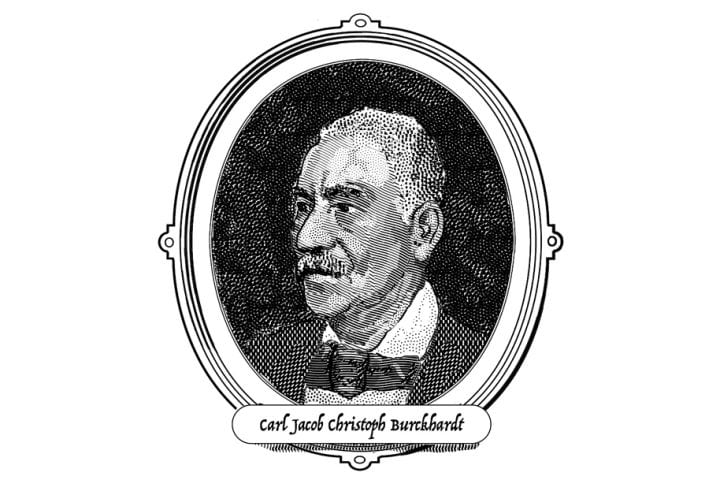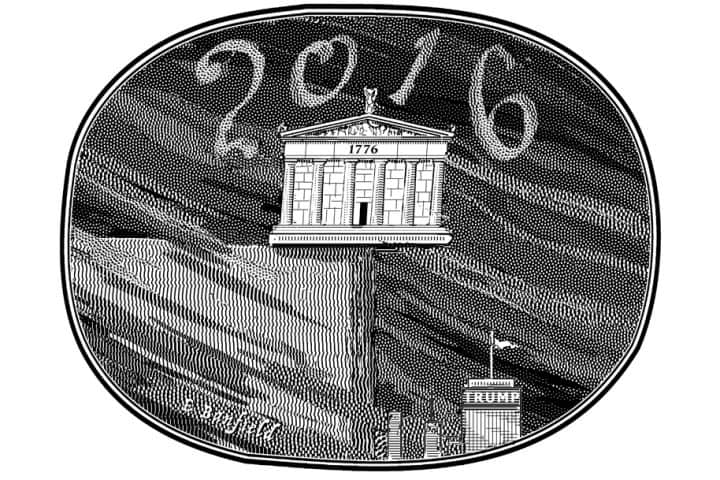Books Reviewed
This long biography’s publication just two years after an even lengthier one by Fred Kaplan signals a healthy renewal of interest in John Quincy Adams, the statesman who embodied the distinctive qualities of America's founding generation which contrast most fully with those prevalent in our time. The book consists of recurring considerations of Adams’s character and his performance in public and private life.
Traub, who teaches foreign affairs at New York University, leaves no doubt that Adams’s character is foreign to today’s standards in every way, and that nearly all of his public and private behavior is as well—and that Traub himself stands clearly on the side of these standards. And yet it is just as clear that Traub’s respect for Adams borders on reverence. Yes, Adams was as rigid with others as he was with himself. Being his wife or child must have been about as pleasant as it was for persons dealing with him in his official capacities. But then again, all concerned could count on being treated with as much learned attentiveness, impartiality, kindness, and generosity as justice allowed. As a result, the United States of America could hardly have been better served than by this throwback to Puritanism, who carried the founding generation’s legacy into the mid-19th century. This biography’s attraction lies in the author’s unspoken but obvious wish that today’s America could do with maybe just a little of that Puritanism.
* * *
Consider the 1841 Supreme Court case that freed the Africans who took over the Spanish slave ship Amistad, which the U.S. Coast Guard had brought ashore in Connecticut. Lower courts had concluded that the Africans had never been anyone’s lawful property because they had been captured in Africa after America banned the slave trade. But President Martin Van Buren’s administration appealed to the Supreme Court that ship and cargo must be returned to Spain under treaty law. Eleven years after leaving the White House, Adams prepared unremittingly for months to argue for upholding rather than overturning the lower court findings.
Speaking to the Court for two days from memory, he showed that the government’s assertion of treaty law was invalid and its motives insincere, as revealed by the willful mistranslation of the term by which the Spanish government had referred to the Africans. Principally, however, the government’s claims contravened basic legal principles, from the Code of Justinian to the Declaration of Independence. Adams then drove home the contradiction at the heart of the government’s case: how could these Africans, whom the government alleged to have acted as pirates, have pirated themselves? If they were property they weren’t pirates, and if they were pirates they weren’t property. He ended by reminding these mostly old Justices of their primordial duty to truth, for which God would soon hold each of them accountable. Seven of the Justices were slave owners, yet Adams won 7 to 1 (one Justice had, in fact, died during the trial), with Roger Taney, later the author of the Dred Scott decision, in the majority.
* * *
Adams’s own story, however, starts with eight-year-old Johnny witnessing the 1775 carnage at Bunker Hill alongside his mother, with the family’s mingling of patriotism and Christian piety, with an education consisting largely of Latin and Greek classics, and, as his father worked for independence in Philadelphia, with his shouldering more and more household responsibilities. These included a weekly 18-mile mail ride by himself to Boston and back. When John Adams went to Europe in February 1778 to negotiate the Franco-American treaty and then secure funds from the Netherlands, ten-year-old Johnny went with him. He became fluent in French, then Dutch, accustoming himself to European society while continuing his education under both parents’ close watch—albeit by elaborate letters from his mother, still in Massachusetts.
So fully did he make his parents’ expectations his own that Adams was found, at age 14, more fit than any American in Europe to act as secretary to Francis Dana, the newly appointed U.S. minister to Russia. He, not Dana, actually transacted embassy business because he, not Dana, spoke and wrote French, the diplomatic language. Two years later, in 1782, he was his father’s assistant in the negotiations for the treaty by which the United States gained its independence. There followed diplomatic interludes in London and Paris, during which the young man dined as an equal with the great men of the age, and formed a lifelong friendship with Thomas Jefferson. Meanwhile, he translated Suetonius from Latin to French. By the time he entered Harvard, he had accomplished more than most successful men do in a lifetime.
* * *
Traub’s biography is excellent in its account of how much Adams thought, wrote, and did as he morphed from love-struck law student to unhappy young lawyer, to George Washington’s minister to the Netherlands, through his marriage and ministership to Prussia, to his Senate career cut short by his adherence to principle, to his return to diplomacy as James Madison’s minister to Russia, then to negotiations for the end of the War of 1812, then to his ministership to Britain, to his spectacular tenure as secretary of state, to the presidency, and finally to his 17 years as the congressman who embodied America’s conscience. As the reader wades through the details, he must marvel along with Traub at the consistency with which Adams maintained his personal discipline and his principles.
Personal: Exercise daily. Walk for an hour or two whether it’s 30 below as in St. Petersburg or 95 above as in D.C. And when it gets too hot, swim naked in the Potomac even when you’re president of the United States or over 70. Read the Bible and pray. Be financially responsible for yourself and for all who depend on you. Pass up the love of your life, brokenhearted, because you have not yet secured a solid independent livelihood. End up supporting parents and ne’er-do-well siblings, children, grandchildren, and relations-by-marriage. Work: Christ’s parable of the talents must have been burned into his brain, because using God’s time for the advantage of truth, goodness, and beauty was his constant preoccupation. Telling the truth come what may was the bridge between his personal and political principles.
* * *
The Declaration of Independence was the first principle of his politics. Because of it, enhancing the United States while protecting its fidelity to the Declaration was the paramount duty that de-legitimizes any and all partisanship. Hence Senator Adams supported President Jefferson’s 1803 Louisiana Purchase because it doubled America’s size even though doing so outraged Adams’s fellow Federalists. He supported Jefferson's 1808 Embargo Act (for which he was ostracized by the Federalist Party) because, albeit inadequate, it was the only lever vis-à-vis Britain that America could use at the time. Secretary of State Adams, in the course of negotiating the Transcontinental Treaty of 1819, insisted on Spain’s cession of claims north of a line extending westward to the Pacific rather than on defining Louisiana’s border a few miles farther westward. Extending America across the continent was worth whatever criticism it brought forth. President Adams refused to bolster his political position by benefiting his supporters, or by courting popularity in any way, knowing full well that this would doom his reelection. Opposition to slavery, intellectual and visceral, defined Congressman Adams’s career at a time when slavery was ascendant. He led his Whig Party in opposition to the admission of Texas, though this was likely to lead to the party’s defeat in the next election, because he knew that Texas’s admission would bring war with Mexico and that its status as a slave state would heighten the chances of civil war.
* * *
As Traub contrasts Adams’s principles and behavior with those prevalent today, he nevertheless tries to show Adams as embryonic of his favorite modern political positions. Thus, for Traub, President Adams’s “internal improvements” agenda was prototypical of the domestic policy of today’s “liberal Democrats.” Yes, Adams wanted the federal government to build interstate roads, canals, and a national university. But Traub’s fine print shows clearly enough that Adams’s version of America’s greatness, founded as it was on strict Christian morality and near worship of the Constitution’s limits as a bulwark thereof, is poles apart from that of our contemporaries who want to remake America in their own image.
Traub also gives the impression that the foreign policy Adams outlined in the July 4, 1821 speech for which he is most remembered (“America does not go abroad in search of monsters to destroy”) is prototypical of the default preference of today's bipartisan ruling class: minimum of force in the pursuit of maximum pretense. But “democracy promotion”—whether Wilsonian or neoconservative—pursued with token use of force is the very opposite of what Adams had in mind.
For example, Traub writes that the Monroe Doctrine, which Adams called “the most important paper that ever went from my hands,” stated “a special protective relation” with Latin America and that, “in the clash of world systems,” the United States “would not permit” the new world’s commitment to republicanism “to be jeopardized.” But the Doctrine was not at all about protecting Latin America. That would have been clearer had Traub related at greater length Adams’s account of the cabinet meeting preceding President James Monroe’s speech. Attorney General William Wirth had asked what sort of commitment to the use of force this implied. Adams re-emphasized that the Doctrine’s force lay in what Traub calls “the [implicit] reciprocal bargain—no interference in Europe in exchange for none in south America.” But Adams made clear that managing this implicit bargain would depend on the balance of interests and power in any given situation. Fighting to keep Europe out of Cuba, for example, would make more sense than for keeping it out of Chile. What is nearest is dearest.
* * *
Like his father, Adams wanted a big navy. He once explained to Lord Castlereagh that were America’s navy but one-third the size of Britain’s, no one would ever again hear of the Barbary pirates. By the same token, he passionately defended General Andrew Jackson’s expedition into Spanish Florida to shoot and hang people who had been terrorizing American settlers. Focused on the United States, Adams wanted a foreign policy that matched national interests with the capabilities to sustain them. Henry Clay and John C. Calhoun almost persuaded President Monroe to risk war with Turkey by helping the Greeks. But Adams had no patience with “the enthusiasm which evaporates in words.”
Traub writes that perhaps Adams’s main contribution to the Monroe Doctrine—which, in fact, brought together many of the founding generation’s principles—was to make it more “astringent” because he added his own “vinegar” to it. Had his account of Adams’s foreign policy been more detailed—examining, for example, his determination to make sure that negotiations with the Russian ambassador proceeded on the firm basis of mutual understanding—Traub might better have described that contribution as “measured sobriety.”
None of this is to take away from a book that is worth reading, about a statesman worth emulating. It is especially nice to sense the attraction that this arch-conservative politician ended up exercising on his progressive biographer. Good for both.




